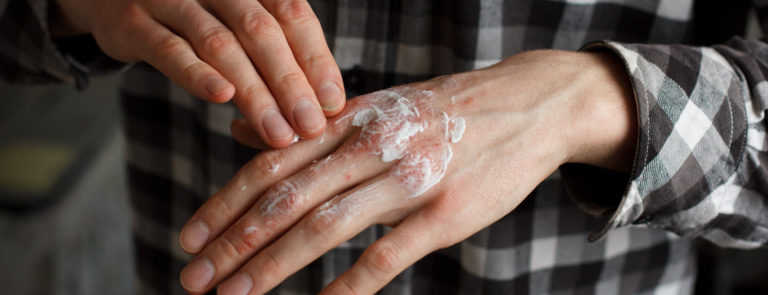20% off €40
3 ways to treat psoriasis

Psoriasis is a skin condition that affects around 2% of the UK population.
Anybody of any age can develop it however, it’s most common for people under 35-years-old and under to have it.1
In this article, we talk you through what psoriasis is, as well as some of the common causes, symptoms and how to treat psoriasis.
What is psoriasis?
If you have psoriasis, then it’s possible for you to find that it comes and goes over the years.
Although it can make people’s skin look red and scaly, psoriasis isn’t a contagious skin condition and therefore cannot be passed on from one person to another.
The outer layer of our skin cells are constantly regenerating, which usually takes around three to four weeks.
But when you have psoriasis, the skin cells divide more quickly, resulting in new cells being created and shedding in as little as three to four days.2
What causes psoriasis?
Genetic make-up and wider environment factors are among the main psoriasis causes.
-
Psoriasis and genetics
You may or may not already know this, but psoriasis is something that can be passed on genetically.
So, if somebody in your family has psoriasis, then you are more likely to develop it too at some point.3
What does psoriasis look like?
As with most skin conditions, there are different forms of psoriasis.
Plaque psoriasis is the most common form of psoriasis, although it’s perfectly possible for people to have more than one form of it at any one time.4
Let’s take a look at the different psoriasis types:5
- Plaque psoriasis – this is when patches of thick raised skin that’s covered with silvery scales develop. The patches can usually be found on the scalp, elbows, knees, or lower back.
- Scalp psoriasis – thin or thick patches of scaly psoriasis can appear on the scalp and extend to the forehead, neck and ears.
- Guttate psoriasis – is most common in children. They tend to develop it after getting an infection, such as strep throat. It looks like small scaly spots.
- Inverse psoriasis – is often found in areas where skin touches skin, such as the armpit or groin. Shiny smooth patches are created that are bright red and sore.
- Pustular psoriasis – develops as pus-filled blisters and thick scaly skin on people’s hands and feet. The skin is extremely prone to cracking.
How do you treat psoriasis?
If you’ve been wondering what the best treatment for psoriasis is, it’s important to know that unfortunately there’s no cure for it.
However, there are certain psoriasis treatments out there that can help ease and manage the symptoms. Treatments include:
Method 1: Topical treatments
Psoriasis creams and ointments
Are applied to the affected areas. For some people, these creams and/or ointments are enough to keep their condition in check however, it can take up to six weeks for them to start to see the effect of using them.
For cases of scalp psoriasis, a combination of shampoo and an ointment is most commonly recommended.6
There are also certain psoriasis-enhancing hair products available that have been specifically formulated to help with scalp psoriasis, such as those in the Miaderma range.
Emollients
Are a form of moisturiser that work by helping the skin to retain moisture by covering it in a protective film.
One of the main benefits of using emollients is that they can help to reduce itching and scaling.7
Steroid creams (topical corticosteroids)
Are frequently used to treat mild to moderate psoriasis.
They work by reducing inflammation, which helps slows down the rapid production of skin cells and reduces itching.8
Method 2: Controlled psoriasis-conscious diet
People’s diets have the potential to influence their psoriasis.
For instance, while the link between alcohol and psoriasis isn't clear, experts say that if you drink, it should ideally be in moderation.
Studies have shown that people who drink heavily don't respond well to psoriasis treatments.9
Furthermore, seeing as psoriasis is an inflammatory skin condition, eating certain anti-inflammatory foods can potentially help ease the symptoms. Examples include:
- Fruits and vegetables - especially berries, cherries and leafy greens
- Oily fish - salmon, sardines, and other fish rich in Omega 3 fatty acids
- Antioxidant-rich herbs and spices – such as thyme, sage, cumin and ginger
- Healthy sources of fat – such as olive oil, seeds, and nuts10
Method 3: Vitamins and supplements
If you can’t incorporate the foods above into your diet or if you need an extra boost in some areas, taking certain vitamins and supplements may help. In particular:10
- Omega 3 – can help reduce inflammation
- Vitamin D – may slow down the rapid skin cell growth
- Glucosamine and Chondroitin - Glucosamine is thought to help with cartilage formation and repair and reduce inflammation. Chondroitin can help by encouraging cartilage elasticity and preventing cartilage breakdown
For more insight on psoriasis, check out this article, ‘Could your psoriasis be down to your gut?’
Last updated: 29 December 2021
- https://www.nhs.uk/conditions/psoriasis/
- https://knowyourskin.britishskinfoundation.org.uk/condition/psoriasis/
- https://www.nhs.uk/conditions/psoriasis/causes/
- https://www.aad.org/public/diseases/psoriasis/what/look-like
- https://www.aad.org/public/diseases/psoriasis/what/look-like
- https://www.nhs.uk/conditions/psoriasis/treatment/
- https://www.nhs.uk/conditions/psoriasis/treatment/
- https://www.nhs.uk/conditions/psoriasis/treatment/
- https://www.webmd.com/skin-problems-and-treatments/psoriasis/psoriasis-avoid-foods
- https://www.webmd.com/skin-problems-and-treatments/psoriasis/psoriasis-avoid-foods
- https://www.psoriasis.org/treating-psoriasis/complementary-and-alternative/diet-and-nutrition/vitamins-and-supplements



